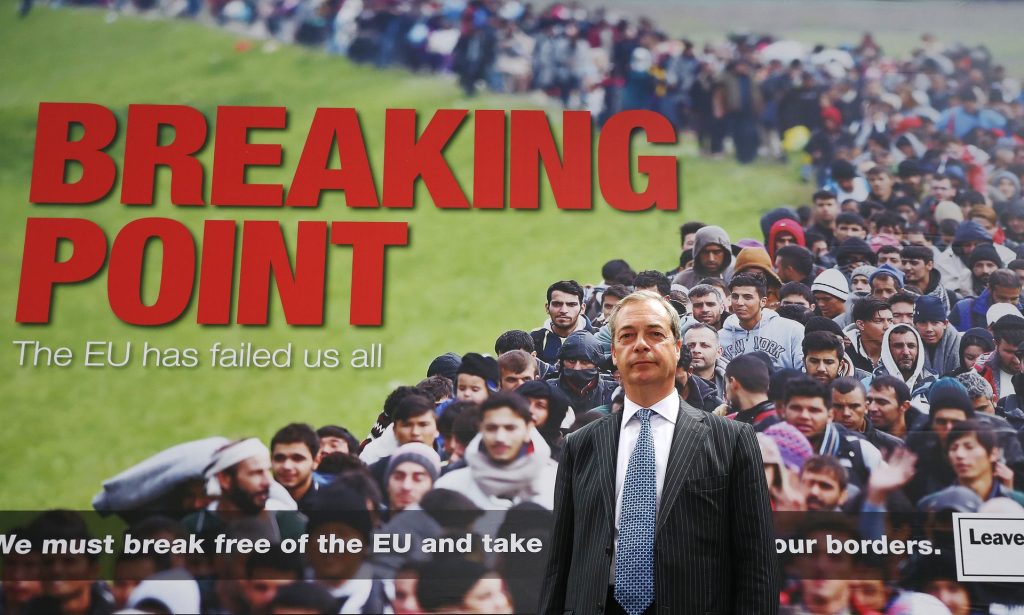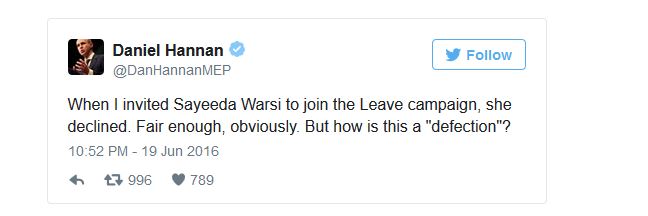Sayeeda Warsi, the former chair of the Conservative party, has said she will no longer support the campaign to leave the European Union just days before the referendum, accusing it of “hate and xenophobia”.
Warsi said the positive case for leaving the EU had been neglected by the official campaign, though leading leave campaigners have denied she was ever an active participant in the campaign.
“Why is it people like me, instinctively Eurosceptic who feel the EU needs reform … feel they now have to leave leave?” she told BBC Radio 4’s Today programme on Monday. “Because day after day what are we hearing? The refugees are coming, the rapists are coming, the Turks are coming.”
Warsi’s intervention came amid a slew of news around the referendum campaign, with car manufacturers, Richard Branson and premier league football clubs urging a vote for remain.
Warsi cited the poster showing migrants and refugees queueing on the border of Slovenia with the caption “Breaking point” as her key reason for leaving the campaign, as well as the repeated comments made by Michael Gove over Turkey’s accession to the EU.
Warsi said the image in the poster was “perpetuating a set of lies about who those people are, where they were going, suggesting they were coming to the United Kingdom”.
“This kind of nudge-nudge, wink-wink xenophobic racist campaign may be politically savvy or useful in the short term but it causes long-term damage to communities,” she told the BBC.
Warsi said Conservative mayoral candidate Zac Goldsmith’s campaign in London against Sadiq Khan had been another example of “divisive toxic politics [which] must no longer be allowed to be successful and although I would have wanted to see a mayor who was a Conservative candidate, it was a relief that campaign did not succeed”.
Accusations of divisive tactics by Vote Leave intensified after the shock murder last week of MP Jo Cox who had campaigned for refugees’ rights. Her alleged killer, Thomas Mair, replied: “Death to traitors, freedom for Britain,” when asked to give his name at a court appearance on Saturday.

Photograph: Philip Toscano/PA
Farage, the Ukip leader, was forced to fend off criticism of the poster over the weekend as polls indicated the two sides were neck-and-neck ahead of the 23 June vote. George Osborne, the chancellor, called it “disgusting and vile” and said it had “echoes of literature used in the 1930s”.
Speaking on the Today programme, Farage said the poster had been withdrawn, saying it was “unfortunate timing that within a couple of hours this terrible tragic murder took place and when we saw that, we immediately withdrew the poster because we understood it was a day for everyone to go quiet and be silent”.
He defended the use of the image of queuing refugees on the Slovenia border, saying it was similar to one of a queue used by Ukip in the mayoral elections, though that poster did not use an image of real people or of refugees. Asked whether it was misleading to use a photograph of refugees in the Schengen zone, of which Britain is not a member Farage said: “We are members of a political union which is failing and we get the knock-on effects.”
Warsi, a member of the House of Lords, was a junior Foreign Office minister under David Cameron until she resigned in protest at the government’s policy on the Israel-Gaza conflict in 2014.
Speaking earlier of the leave campaign, she told the Times: “I look at that group of people and I think they’re not the kind of people I’d get on a night bus with. Why would I want them to run my country?
“I don’t want the leave camp to be running this country and I don’t want the messages coming out of that camp to form the basis of the kind of Britain that I want to live in and to bring my kids up in.”
She also accused Gove of telling “complete lies about Turkey’s accession to the EU”.
Following her announcement, Vote Leave questioned whether Warsi had ever supported its campaign. “When I invited Sayeeda Warsi to join the leave campaign, she declined,” Daniel Hannan, a member of the Vote Leave campaign committee, wrote on Twitter.
Warsi said Hannan was being “disingenuous” but admitted she had not participated in Vote Leave events for a number of weeks, putting her lack of enthusiasm for campaigning down to a feeling of unease.
“I was making the case to leave before Vote Leave had ever formally been established,” she told Today. “I had a very clear conversations where I said I had concerns about people who were now becoming involved in the Vote Leave campaign, taking the message of what Vote Leave stood for down a path that I was not comfortable with… unfortunately those moderate voices have been stifled.”
Separately on Monday, the 20 clubs in football’s top tier have said they would prefer Britain to stay in the EU, according to Peter Scudamore, the executive chairman of the Premier League. “The reason we have concluded that remain is best is because of our outlook. We are a global export, we look outwards,” he said.
“Are we better acting like we want to play our part in the world and be worldly citizens or do we send a signal to world that says actually we’re kind of pulling the drawbridge up here…?
“There is an openness about the Premier League, which I think it would be completely incongruous if we were to take the opposite position.”
Car manufacturers have also warned that a vote to leave would risk jobs in the industry. Mike Hawes, the chief executive of the Society of Motor Manufacturers, told the BBC leaving the EU would jeopardise the industry’s continued success.
Directors at Toyota UK, Vauxhall, Jaguar Land Rover and BMW, as well as from component makers GKN and Magal Engineering, also backed the remain campaign.
He said: “Remaining will allow the UK to retain the influence on which the unique and successful UK automotive sector depends,” Hawes said.
Roy Harvey, the chairman of Vauxhall, said leaving the EU would be undesirable because the industry benefited from the free movement of goods and people.
Vote Leave says British cars are increasingly being exported outside the EU and Brexit could provide a boost to the industry.
A report by the Economist Intelligence Unit earlier in June said UK car sales would decline “over the next few years” if there was a vote to leave the EU.


